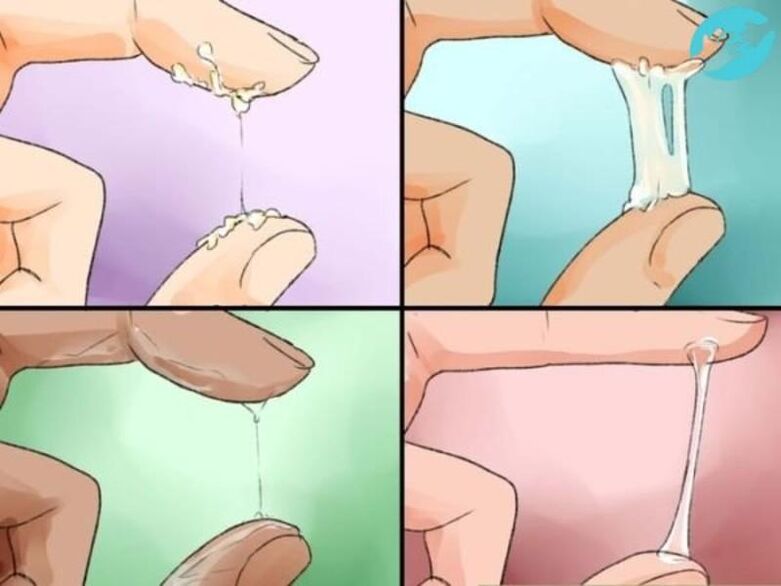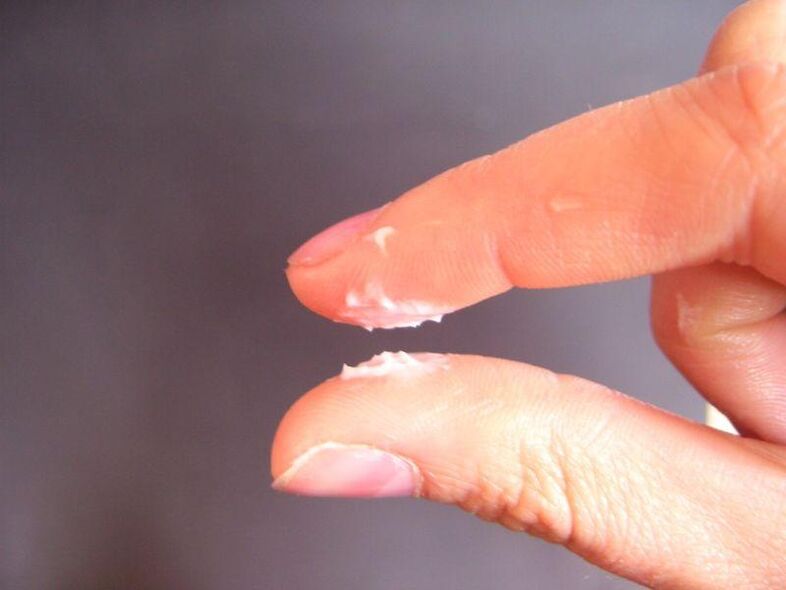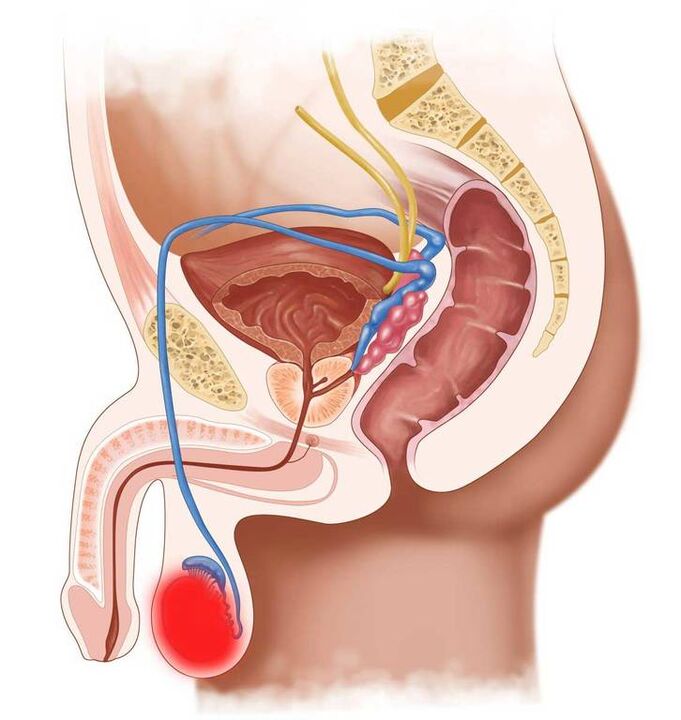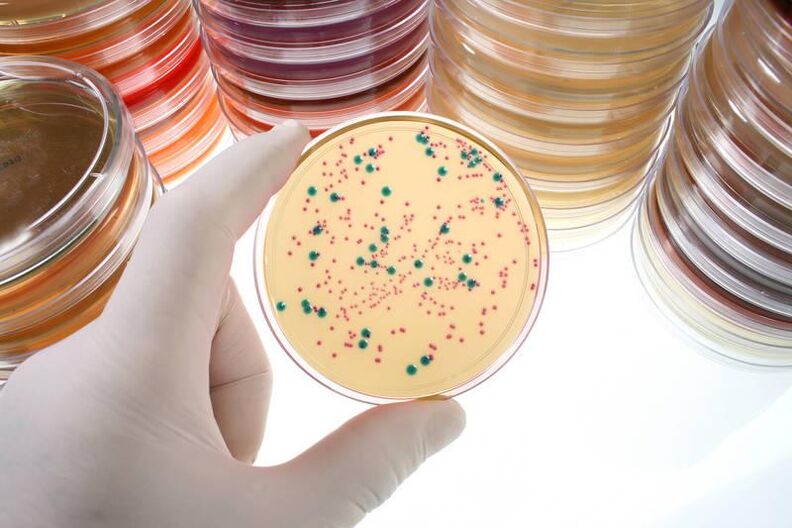A natural physiological process is the allocation of a small volume of the urinary canal in men. This is a type of lubricant obtained through the work of the glands concentrated on the head of the penis. Abundance, heterogeneous consistency and cloudy color are signs of pathological disorders in the genitourinary system.

Changes in the color, consistency or amount of discharge from the urethra in men indicate the presence of a disease of the genitourinary system
Normal discharge in men
A whitish or colorless liquid is constantly present on the foreskin of the penis. It may gradually come out of the urethra with pressure, sometimes spontaneously.
Table "Criteria for normal discharge in men"
| type of discharge | Characteristic |
|---|---|
| smegma | The lubricant is produced by the preputial glands, has the consistency of sour cream, the color is white, sometimes with a yellow or green tint. The secret of the residues of fat and bacteria prevents the foreskin from rubbing against the head. Fullness depends on age - the greatest amount of fluid in adolescence and the smallest in old age (virtually absent) |
| Colorless discharge that looks like clear mucus (libido urethrorrhea) | Mucus is produced by the urethral and bulbourethral glands during erection (when aroused). Its purpose is to lubricate the urethra for the unimpeded passage of seminal fluid through it. The amount of secretion is usually scarce, but can increase depending on the abstinence from sexual contact (the less often a man has sex, the more abundant is the preeculative secret - sometimes it drips from the penis). Is it possible to get pregnant from such secretions? Practically not, because they contain too little sperm. But after semen is released, repeated unprotected intercourse can lead to conception |
| Ejaculation without intercourse (emission) | Spontaneous ejaculation occurs in the morning (the highest level of testosterone in the blood). A similar phenomenon occurs during sleep. Pollution is most commonly observed in adolescents, but can also occur in adult males who do not have regular sexual intercourse. |
| Clear discharge from the urethra (prostorrhea) | The composition of the secretions is semen and prostatic secretions. The liquid comes out of the urinary canal with strong tension during defecation, coughing. Vitreous discharge from the penis also occurs after passing urine - a normal phenomenon |
The turbidity of the discharge or the acquisition of an uncharacteristic shade from them is the first symptom of urogenital pathologies. Violations can be accompanied by a change in the color of urine, pain in the lower abdomen, discomfort in the genitals.
Causes of urethral discharge
Sexually transmitted diseases, nonspecific infections, malignant tumors, mechanical damage (injuries, operations) can cause atypical discharge from the penis. The type of discharge from the penis depends on the specific pathology in the urogenital system.
inflammatory processes
Foci of inflammation can be caused by a violation of the microflora of the genital organs caused by opportunistic organisms - Staphylococcus aureus, Candida fungus, Escherichia coli. Such bacteria are always present on the mucous membrane of the foreskin in small quantities, and with a decrease in immunity (long intake of antibiotics, moral exhaustion or hypothermia of the body), they begin to actively develop and provoke serious diseases.
- thrush. This pathology is characterized by curd-white discharge with white pellets resembling cottage cheese. The secret is plentiful with an unpleasant sour smell. During ejaculation or urination, a man feels a burning sensation in the penis, pain and pain in the groin.
- Inflammatory foreskin lesiondistinguishes purulent jelly-like secretions with the smell of putrefaction. At the same time, there is severe redness and pain in the head.
- Urethral gardnerellosis. The nature of the secreted liquid is scarce, it smells like rotten fish, the color is green or yellow.
- prostatitis. The fluid secreted is cloudy and appears at the end of urination. In the acute course of the disease, the pathological mystery of the penis is plentiful, and during the chronic phase it is scarce. In addition to atypical discharge, a man suffers from difficulty urinating and pain in the groin.

Nonspecific inflammation is not sexually transmitted. The source of their occurrence is an imbalance in the urogenital flora.
Non-inflammatory pathologies
Chronic diseases or injuries not only of the genital organs, but also of the spine, nervous system, constant stress can provoke pathological discharge.
- hematorrhea- The condition is characterized by bloody discharge without clots. The cause can usually be mechanical damage (trauma, catheter placement, flora swab). In this case, the secreted blood does not clot and quickly stops. When small stones come out, mucus with bloody threads from the urinary tract is present after or during urination.
- spermatorrhea- involuntary ejaculation outside of sexual intercourse or masturbation. The cause of the whitish discharge is the weakening of the tone of the seminiferous tubules, the violation of the innervation in them.
- Oncological neoplasms in the organs of the genitourinary system. Brown discharge contains blood clots, the consistency is mucous, there are purulent inclusions and a corresponding odor.

With problems in the contractile function of the smooth muscles of the bladder, a benign tumor of the prostate, the discharge is white or transparent, liquid and copious, but odorless.
STDs
The first symptom of STDs is abnormal discharge from the penis. Their type depends on the specific pathogen:
- Foamy, colorless, or whitish mucus that contains pus occurs as a result of an exacerbation of mycoplasmosis, ureaplasmosis, or chlamydia. There is especially a lot of plaque on the tip of the penis when it is affected by chlamydia.
- A small amount of clear and sticky liquid is a symptom of chronic chlamydial infection, mycoplasmosis, or ureaplasmosis.
- Green or yellow mucus with a pungent odor is a sign of gonorrhea. The discharge in this case is sticky and copious, has a thick consistency. The disease causes great discomfort - the genitals hurt, itch and bake, especially when urinating.
Important!
The amount of secretion from the penis, its color and smell can change with neglect of the disease. Often infections are combined (gonorrhea and trichomoniasis, ureaplasmosis and mycoplasmosis), which aggravates the patient's condition. In the event of unnatural fluid from the penis, you should immediately contact a specialist.
Which doctor should I contact?
An uncharacteristic secret from the urethra, difficult emptying of the bladder, pain in the groin are symptoms that should be immediately taken to the hospital. A urologist deals with diseases of the genitourinary system. After examining the patient and assessing his complaints, the doctor may prescribe a consultation with other highly specialized specialists:
- venereologist (if sexual infections are suspected);
- Oncologist (if there are characteristic signs of a tumor process).

A full laboratory and instrumental examination is required to make a definitive diagnosis.
diagnosis
A comprehensive examination begins with a thorough examination by a urologist:
- Visual assessment of the condition of the genitals - penis, head and foreskin, perineum. The purpose of the examination is to detect injuries, deformities, seals, inflammation and the presence of a rash.
- Palpation in the groin. The condition of the lymph nodes is assessed, their size, density, skin color.
- Prostate check. The procedure is performed by inserting a finger into the anus. The aim is to identify seals in the prostate and to take biological material for analysis.
- Collection of secretions from the urinary canal for planting on flora and microscopy - allows you to identify the source of the disease and understand the degree of the inflammatory process.

Next, the patient must pass a clinical blood test, if necessary, detailed biochemistry. Hardware diagnostics are also mandatory:
- Ultrasound of the kidneys, prostate and bladder;
- CT scan;
- urography.
Important!
If there is a suspicion of malignant tumors in the genitourinary system, a man is prescribed a biopsy and a full histological examination of the biological material is carried out.
Treatment of pathological secretions
Heterogeneous discharge from the urethra of unnatural color is just a symptom of the disease. You need to treat the pathology that caused changes in the secret of the penis. Based on the nature of the negative processes in the genitourinary system, doctors use several groups of drugs:
- Antifungal drugs. They are used for Candida lesions.
- Antibiotics from the group of cephalosporins - are used in gonorrhea, bacterial urethritis.
- Long-acting drugs.
- Anti-inflammatory antibiotics.
In addition to medicines, the patient is given vitamin complexes, as well as immunostimulating drugs.
prevention
In order to avoid the negative consequences of urogenital pathologies, it is important to take preventive measures.
- Observe hygiene. It is important to wash the glans well and push back the foreskin to prevent bacteria from multiplying.
- Monitor intimate life. Eliminate promiscuity, always protect yourself.
- Empty the bladder in time to avoid overstretching.
- Avoid stress, emotional overwork.
- Optimize physical activity - do not exhaust the body with hard work or excessive training.

It is necessary to eat right, get rid of bad habits and avoid hypothermia.
Normal male discharge is clear or white in moderate amounts. The appearance of an unpleasant odor, impurities of pus or blood, a change in the consistency of the vitreous humor to curd, stickiness or water are symptoms of pathological abnormalities in the organs of the genitourinary system. To identify the causes of this condition, you need to contact a urologist. After a thorough examination, doctors prescribe the appropriate treatment.


























